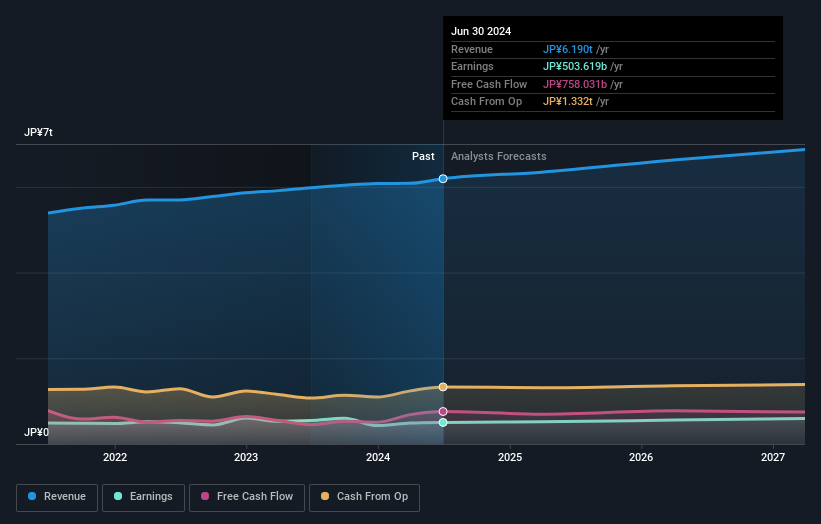- Japan
- /
- Wireless Telecom
- /
- TSE:9434
Public companies account for 40% of SoftBank Corp.'s (TSE:9434) ownership, while individual investors account for 37%

Key Insights
- SoftBank's significant public companies ownership suggests that the key decisions are influenced by shareholders from the larger public
- 50% of the business is held by the top 4 shareholders
- 22% of SoftBank is held by Institutions
A look at the shareholders of SoftBank Corp. (TSE:9434) can tell us which group is most powerful. With 40% stake, public companies possess the maximum shares in the company. That is, the group stands to benefit the most if the stock rises (or lose the most if there is a downturn).
Meanwhile, individual investors make up 37% of the company’s shareholders.
In the chart below, we zoom in on the different ownership groups of SoftBank.
Check out our latest analysis for SoftBank

What Does The Institutional Ownership Tell Us About SoftBank?
Institutional investors commonly compare their own returns to the returns of a commonly followed index. So they generally do consider buying larger companies that are included in the relevant benchmark index.
As you can see, institutional investors have a fair amount of stake in SoftBank. This can indicate that the company has a certain degree of credibility in the investment community. However, it is best to be wary of relying on the supposed validation that comes with institutional investors. They too, get it wrong sometimes. If multiple institutions change their view on a stock at the same time, you could see the share price drop fast. It's therefore worth looking at SoftBank's earnings history below. Of course, the future is what really matters.

Hedge funds don't have many shares in SoftBank. Looking at our data, we can see that the largest shareholder is SoftBank Group Corp. with 40% of shares outstanding. Meanwhile, the second and third largest shareholders, hold 5.1% and 2.6%, of the shares outstanding, respectively.
Our research also brought to light the fact that roughly 50% of the company is controlled by the top 4 shareholders suggesting that these owners wield significant influence on the business.
Researching institutional ownership is a good way to gauge and filter a stock's expected performance. The same can be achieved by studying analyst sentiments. There are a reasonable number of analysts covering the stock, so it might be useful to find out their aggregate view on the future.
Insider Ownership Of SoftBank
The definition of company insiders can be subjective and does vary between jurisdictions. Our data reflects individual insiders, capturing board members at the very least. The company management answer to the board and the latter should represent the interests of shareholders. Notably, sometimes top-level managers are on the board themselves.
Insider ownership is positive when it signals leadership are thinking like the true owners of the company. However, high insider ownership can also give immense power to a small group within the company. This can be negative in some circumstances.
Our most recent data indicates that insiders own less than 1% of SoftBank Corp.. Being so large, we would not expect insiders to own a large proportion of the stock. Collectively, they own JP¥56b of stock. Arguably recent buying and selling is just as important to consider. You can click here to see if insiders have been buying or selling.
General Public Ownership
The general public, who are usually individual investors, hold a 37% stake in SoftBank. While this size of ownership may not be enough to sway a policy decision in their favour, they can still make a collective impact on company policies.
Public Company Ownership
It appears to us that public companies own 40% of SoftBank. It's hard to say for sure but this suggests they have entwined business interests. This might be a strategic stake, so it's worth watching this space for changes in ownership.
Next Steps:
It's always worth thinking about the different groups who own shares in a company. But to understand SoftBank better, we need to consider many other factors. Case in point: We've spotted 2 warning signs for SoftBank you should be aware of.
Ultimately the future is most important. You can access this free report on analyst forecasts for the company.
NB: Figures in this article are calculated using data from the last twelve months, which refer to the 12-month period ending on the last date of the month the financial statement is dated. This may not be consistent with full year annual report figures.
New: Manage All Your Stock Portfolios in One Place
We've created the ultimate portfolio companion for stock investors, and it's free.
• Connect an unlimited number of Portfolios and see your total in one currency
• Be alerted to new Warning Signs or Risks via email or mobile
• Track the Fair Value of your stocks
Have feedback on this article? Concerned about the content? Get in touch with us directly. Alternatively, email editorial-team (at) simplywallst.com.
This article by Simply Wall St is general in nature. We provide commentary based on historical data and analyst forecasts only using an unbiased methodology and our articles are not intended to be financial advice. It does not constitute a recommendation to buy or sell any stock, and does not take account of your objectives, or your financial situation. We aim to bring you long-term focused analysis driven by fundamental data. Note that our analysis may not factor in the latest price-sensitive company announcements or qualitative material. Simply Wall St has no position in any stocks mentioned.
About TSE:9434
SoftBank
Engages in the telecommunication and information technology businesses in Japan.
Solid track record with adequate balance sheet and pays a dividend.
Similar Companies
Market Insights
Community Narratives




